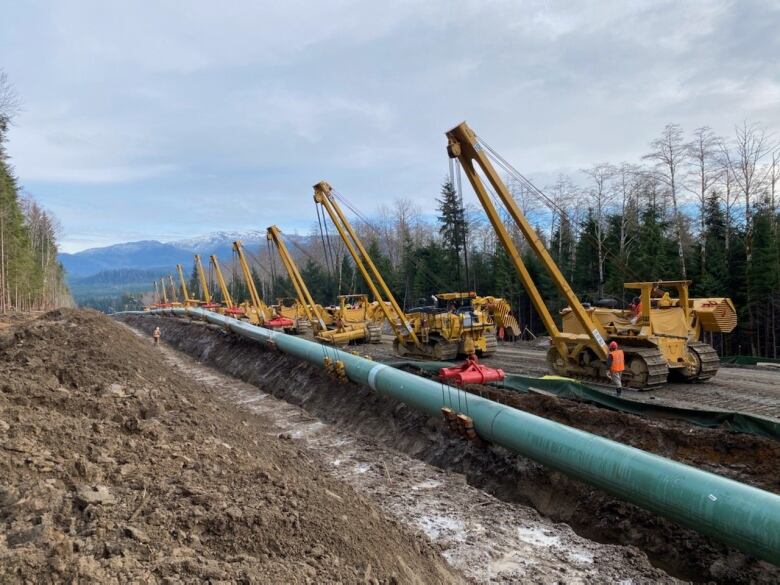Over 500 pipeline workers stranded behind Wet'suwet'en clan blockades, Coastal GasLink says
Gidimt'en Clan members want to evict pipeline project from
traditional territories
Coastal GasLink says more than 500 pipeline workers are stranded after a Wet'suwet'en Nation clan set up three blockades along the only access road to two work camps in a remote part of northern B.C.
The company says supplies at the camps will run out in the coming days, water is begin conserved, and workers won't be able to reach medical care in an emergency because of the "illegal blockades."
"Unlawful actions ... have put our people in danger," Coastal GasLink said in a statement.
On Sunday, the Gidimt'en Clan of the Wet'suwet'en Nation told Coastal GasLink it would enforce the eviction of pipeline workers from its traditional territories near Houston, B.C., about 1,000 kilometres northwest of Vancouver.
According to the Gidim'ten Clan, an enforcement notice, issued at 5 a.m. PT Sunday, provided an eight-hour window for CGL workers to leave before the access road was blocked.
Jennifer Wickham, media co-ordinator for the Gidimt'en checkpoint, which monitors access to part of the territory, says the route on the Morice River Forest Service Road is now impassible for all vehicles, including supply trucks.
Wickham said the blockades were set up to halt Coastal GasLink's plans to drill under the Wedzin Kwa (Morice River).
B.C. Minister of Public Safety and Solicitor General Mike Farnworth said the blockades have "put at risk emergency access and the delivery of critical services" to hundreds of Coastal GasLink workers.
In a written statement Monday, Farnworth said the blockades are endangering dialogue and "good faith commitments" between the Office of the Wet'suwet'en and the province, and also breach a court injunction against blocking access to pipeline worksites.
"The right to protest does not extend to criminal actions," Farnworth said.
WATCH | Minister Marc Miller says discussions over Coastal GasLink pipeline are at "critical junction"
Crown-Indigenous Relations Minister Marc Miller says the federal government is in discussions with Indigenous community members to ease tensions over the Coastal GasLink pipeline. 2:00
Coastal GasLink says it is "committed to dialogue" and notes the pipeline project is fully authorized and permitted by government and has the support of all 20 elected band councils across the pipeline route.
But Wet'suwet'en hereditary chiefs have opposed the project, saying band councils do not have authority over land beyond reserve boundaries.
About 5,000 workers working across northern B.C. are halfway through the construction of the $6.6-billion pipeline.
It's designed to carry natural gas obtained by fracking in northeastern B.C. to a $40-billion LNG terminal on the province's North Coast for export to Asia.
The blockades set up this week are on the same disputed land that made international headlines in early 2020.
That's when several Wet'suwet'en hereditary chiefs and their supporters blocked access to Coastal GasLink pipeline worksites, sparking a nationwide discussion about who gets a say in resource development on land claimed as traditional territory.
The high-profile standoff led to RCMP raids to dismantle the blockade, which in turn sparked rail blockades across the country in support of the hereditary chiefs' cause.
Robert Tuttle, Bloomberg News
Investors need to know that Coastal GasLink's project will not be successful: Wet’suwet’en spokesperson
Sleydo’, Wet’suwet’en spokesperson for Gidimt’en Checkpoint, discusses safety concerns from British Columbia's Public Safety Minister and Solicitor General, Mike Farnworth, on the Coastal GasLink blockades. Sleydo’ says resolution to this conflict will come when Coastal GasLink's pipeline production team exits Wet’suwet’en territory and ceases construction. Sleydo' notes that ample time was given for employees to exit the territory after they passed on an eviction notice, but the company did not tell their employees to leave.
Protesters erected blockades to prevent construction crews from reaching TC Energy Corp.’s natural gas pipeline project in the latest setback for the British Columbian project.
Three blockades on a forest road have isolated accommodations for 500 workers building the Coastal GasLink conduit intended to haul gas to a planned coastal export terminal, according to a TC Energy statement. The protest began Sunday when members of the indigenous Wet’suwet’en community demanded that work crews vacate the group’s territory, according to a separate press release.
“Work on Coastal GasLink continues along the 670 km project corridor,” TC Energy said in an emailed statement. “Construction activity around the protest areas and blockades is paused for safety reasons.”
Costs for the project have escalated over the past couple of years amid frequent protests as well as pandemic-driven work restrictions. The budget inflation, in turn, has fueled friction between TC Energy and backers of the LNG Canada export project over which companies should bear the increased costs.
The latest action by members of the Gidimt’en Clan of the Wet’suwet’en comes almost two years after a similar blockade sparked nationwide protests that put rail shipments of grain, propane, lumber and consumer goods in jeopardy and slowed the economy.
There is no room for compromise with TC Energy on this project, Gidimt’en spokeswoman Sleydo’ said in a BNN Bloomberg TV interview.
“This project does not have consent to go through our territory and it will not proceed,” she said. “People must realize that they cannot walk over indigenous people anymore.”



No comments:
Post a Comment